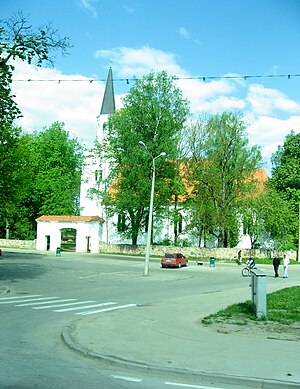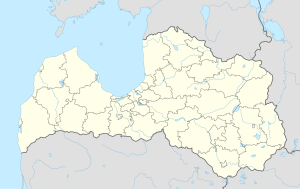Iecava
Iecava
| |
|---|---|
Town | |
 Lutheran church in Iecava. | |
| Anthem: "Ciematā dzimtajā" | |
| Coordinates: 56°36′N 24°12′E / 56.600°N 24.200°E | |
| Country | |
| Municipality | Bauska Municipality |
| First mentioned | 1492 |
| Village status | 1990 |
| City rights | 1 July 2021 |
| Government | |
| • Chairman | Normunds Vāvers |
| Area | |
• Total | 13.86 km2 (5.35 sq mi) |
| • Land | 0.353 km2 (0.136 sq mi) |
| • Water | 0.325 km2 (0.125 sq mi) 2.35% |
| Population (2023) | |
• Total | 9,681 |
| Time zone | UTC+2 (EET) |
| • Summer (DST) | UTC+3 (EEST) |
| Postal code | LV-3913 |
| Website | Iecava official site |
Iecava (ⓘ) (Template:Lang-de) is a town on the via Baltica in Bauska Municipality, in the Semigallia region of southern Latvia. The town has a population of around 9700 people. Iecava lies 40 km south of Riga and 23 km north of Bauska and was mentioned in historical documents as early as 1492. Until the 2021 Latvian administrative reform took into force on 1 July 2021, Iecava was a village and the center of Iecava Municipality.[1]
History
The town was founded by Johann Freytag von Loringhoven in 1492. Although the town's Latvian name has always been Iecava, internationally it was known by its German name Gross Eckau until the beginning of the 20th century. It was the scene of a victory over Russian forces by Prussian troops fighting for Napoleon during his invasion of the Russian Empire[2] and was also the scene of fighting during the Second World War German retreat from the Soviet Union.
South of the town centre lies a park around the former manor of Count Peter Ludwig von der Pahlen, of which only the foundation walls and some yard buildings remain.[3] The French General Marshal MacDonald, who commanded the Prussian troops who were fighting as part of the Grande Armée, occupied the Gross-Eckau castle after battle of Ekau during the Napoleonic War with Russia.[4]
The church of Iecava dates from the 17th Century but was damaged in various wars and incidents from the Battle at Gross-Eckau 7 July 1812[4] to the Second World War and a 1972 fire.
In addition to farming, the town supports manufacturing enterprises including vegetable oil and white spirits.
Notable people
Prominent Latvians born in Iecava include Friedrich Wilhelm Matisohn (1871-1913) , Arvīds Pelše (1899-1983)
See also
References
- ^ "Three more Latvian settlements become official 'cities'". eng.Lsm.lv. 2022-07-07. Retrieved 2022-09-03.
- ^ (in German) Eckau de:Johann Samuel Ersch de:Allgemeine Encyclopädie der Wissenschaften und Künste
- ^ Iecavas muiza. Groß Eckau. By I. Lancmanis. Edited by the Rundale Palace Museum, 2001, 72 p., 75 ill. A monographic study devoted to the history of the estate, architecture, works of art and the family of the counts von der Pahlen. Text in Latvian and German with a summary in English and Russian.
- ^ a b Conrad, Mark, ed. (1912). "Regarding the Battle at Gross-Eckau, 7 July 1812". Russkaya Starina Vol. 151. pp. 95–96. Archived from the original on 24 May 2006.



